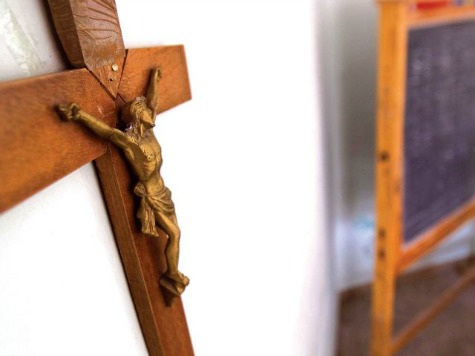
With approximately 100 out of 195 Catholic dioceses throughout the United States embracing the new Common Core State Standards, the controversy is intensifying among Catholic educators not only with regard to the merits of the new standards but also the way in which Catholic schools climbed aboard the Common Core bandwagon at the outset.
In mid-October, a letter from over 130 Catholic scholars, initiated by University of Notre Dame law professor Gerard Bradley, was sent to the United States Catholic bishops, requesting that they abandon any implementation of the Common Core State Standards (CCSS).
The letter states that the new standards do “a grave disservice to Catholic education” in that they are “contrary to tradition and academic studies on reading and human formation.”
Bradley and his fellow scholars also accused proponents of the Common Core of seeking to “transform ‘literacy’ into a ‘critical’ skill set, at the expense of sustained and heartfelt encounters with great works of literature.”
“In fact, we are convinced that Common Core is so deeply flawed that it should not be adopted by Catholic schools which have yet to approve it,” the letter reads, “and that those schools which have already endorsed it should seek an orderly withdrawal now.”
Promoters of Common Core say that it is designed to make America’s children “college and career ready.” We instead judge Common Core to be a recipe for standardized workforce preparation. Common Core shortchanges the central goals of all sound education and surely those of Catholic education: to grow in the virtues necessary to know, love, and serve the Lord, to mature into a responsible, flourishing adult, and to contribute as a citizen to the process of responsible democratic self-government.
Common Core adopts a bottom-line, pragmatic approach to education. The heart of its philosophy is, as far as we can see, that it is a waste of resources to “over-educate” people. The basic goal of K-12 schools is to provide everyone with a modest skill set; after that, people can specialize in college – if they end up there. Truck-drivers do not need to know Huck Finn. Physicians have no use for the humanities. Only those destined to major in literature need to worry about Ulysses.
The educators went on to articulate their concern that the Common Core standards will lower expectations for students in all subject areas as they are developed and will also take for granted materialist concepts that are incompatible with Catholic “spiritual realities,” such as the nature of God and the soul, religious values, and free choice.
“We fear, too, that the history standards will promote the easy moral relativism, tinged with a pervasive anti-religious bias, that is commonplace in collegiate history departments today,” the Catholic educators wrote.
With such deep concerns among Catholic educators, it is worthwhile to consider how Catholic dioceses adopted the Common Core standards in the first place.
Anne Hendershott, a professor of sociology at Franciscan University, compared the adoption of Common Core by Catholic dioceses to the passage of ObamaCare:
Just as Sister Carol Keehan and her Catholic Health Association helped to shepherd the passage of the Affordable Care Act–replete with federal funding for abortion–in the early days of the Obama administration, Sr. Dale McDonald and her “Gold and Platinum textbook partners” affiliated with the National Catholic Educational Association (NCEA), are now helping President Obama continue his “long march” through education.
Helping to guide the Common Core standards through the more than 100 dioceses that have already adopted them, Sr. McDonald has learned much from Sister Carol Keehan. While the NCEA will not be receiving one of the silver tipped signing pens from the healthcare legislation signing ceremony that Sr. Keehan received, the Association has indeed stepped up to sell the Common Core. Like Sr. Keehan’s propaganda videos assuring Catholics that “We Can’t Wait” for the Affordable Care Act, Sr. McDonald has created her own video to reassure parents that the federal government is here to help deliver a federally funded Common Core to Catholic school children–and that we all should “get on board.”
Though proponents of Common Core say that the new standards are not a federal takeover of education, the Obama administration has made clear that it does intend to “fundamentally transform” education in keeping with global standards. This goal could undercut American principles and values, including those associated with the nation’s Judeo-Christian foundation.
As Hendershott explains, the NCEA’s “gold and platinum textbook partners” include William H. Sadlier, Inc., a textbook company that will gain from its promise to provide teachers with class materials that will “prepare students for the 2014/2015 Common Core Assessments.”
In addition, Hendershott observes that NCEA – which functions as a Washington, D.C. lobbying group for Catholic education – recently accepted more than $100,000 in funding from the Bill and Melinda Gates Foundation to promote Common Core in Catholic schools throughout the nation.
Bradley’s letter to the U.S. bishops has been taken seriously, according to the Register. At their recent assembly in Baltimore, the bishops’ National Advisory Council recommended that they re-evaluate the Common Core standards.
Anthony Esolen, an English professor at Providence College in Rhode Island and co-signer of Bradley’s letter, described the Common Core literary standards as teaching “the humanities without the humanity.”
Esolen said that changing Catholic education in response to state or government expectations for public schools has never been positive. He added that the type of student who is generally set apart in his class is not the Catholic school student, but a homeschooler.
“Homeschoolers clean everybody else’s clock, but they are not being taught with the AP test in mind,” he said.
Catholic educators, Esolen said, “need to go back to the roots: What is a human education, and what is a Catholic education? We have plenty of Catholic writers on that subject, going back for centuries.”

COMMENTS
Please let us know if you're having issues with commenting.